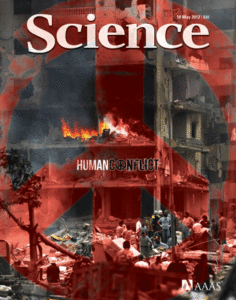Science Magazine’s special issue on Human Conflict
This May 18, Science has a special issue on human conflict, of evolutionary, cognitive and cultural relevance, with contributions from Scott Atran, Christopher Boehm, Samuel Bowles, Frans de Waal, and many others.
From the introduction:
“In this special issue on human conflict, we consider the deep evolutionary roots of violent confrontation. We trace the trajectory of violence and war throughout history, exploring racism, ethnic conflicts, the rise of terrorism, and the possible future of armed conflicts. We also consider our innate capacity to mediate conflict and our ability to achieve—and live in—peace. Competition and conflict both among and within species, for food or a place to live or a mate, are implicit in the process of evolution and thus intrinsic to our biology. But like many other animals, we are also social beings, and, like them, we have evolved behaviors to avoid the detrimental effects of excessive intraspecies violence. These include ritual singing or fighting displays, acts of submission or conciliation, and simple spatial avoidance seen in diverse species as birds, ants, and our primate relatives.
The groups we consider ourselves to be part of, our “ingroups,” are critical to our understanding of “self ” and categorization of “other” or “outgroups”; these groups often form the basis for conflict. Groups can have myriad identities. The first were certainly those of kin, and then ethnicity, but as societies grew, groups identified themselves in more complex ways. Our sense of a “group self ” influences the way we see and feel about the world around us: We are more likely to empathize with those of our own group and more likely to dehumanize outgroups. Groups based around religious or sacred values can increase ingroup reliance and cooperation through costly rituals, and they can also inspire nonrational sacrifices (suicide bombing, for example), whereas reasoned social contracts seem less able to inspire such fervent loyalty. But although we are ready to see the world as made up of coalitions, it is also true that our perception of “us” and “them” is not primordial because people have constantly shifted affiliations throughout history.”
From the table of contents:
News:
E. Marshall: Parsing Terrorism (Terrorism research has expanded rapidly since 9/11, shifting its focus from human pathology to the analysis of how rational people interact with violent groups.)
A. Lawler: The Battle Over Violence (Under the long shadow of Rousseau and Hobbes, scientists debate whether civilization spurred or inhibited warfare—and whether we have the data to know
A. Gibbons: The Ultimate Sacrifice (Seeking to impress both gods and humans, early state societies across the globe displayed their power by ritually killing human victims.)
E. Culotta: Roots of Racism (Humans everywhere divide the world into "us" and "them." Why are we so tribal?)
A. Lawler: Civilization's Double-Edged Sword (Recent archaeological finds of ancient massacres raise questions about how violence changed as societies became more complex.)
M. Hvistendahl: Gender and Violence (Researchers are probing links between the status of women in a society and its propensity toward war.)
Articles:
C. Boehm: Ancestral Hierarchy and Conflict (Conflict, and its resolution, were present in the ancestor we share with our closest primate relatives.)
R. J. Crisp and R. Meleady: Adapting to a Multicultural Future (Evolved propensities stumble when individuals who are simultaneously members of several distinct groups mix.)
J. Esteban et al.: Ethnicity and Conflict: Theory and Facts (Ethnic friction depends on the number and size of the ethnic groups.)
J. Scheffran et al.: Climate Change and Violent Conflict (Current debates over the relation between climate change and conflict originate in a lack of data as well as the complexity of pathways connecting the two phenomena.)
F. B. M. de Waal: The Antiquity of Empathy (Empathy has deep evolutionary roots.)
D. P. Fry: Life Without War (Divergent cultures have reduced conflict by following development of similar peace systems.)
N. Ellemers: The Group Self (In some contexts, we see ourselves as individuals, in others, as part of a group.)
S. Atran and J. Ginges: Religious and Sacred Imperatives in Human Conflict (Religious and sacred values can be used to reinforce ingroup status and motivate both cooperation and conflict.)
S. Bowles: Warriors, Levelers, and the Role of Conflict in Human Social Evolution (Adoption of whole-sale (and often beneficial) changes to society may have required large-scale conflict.)



